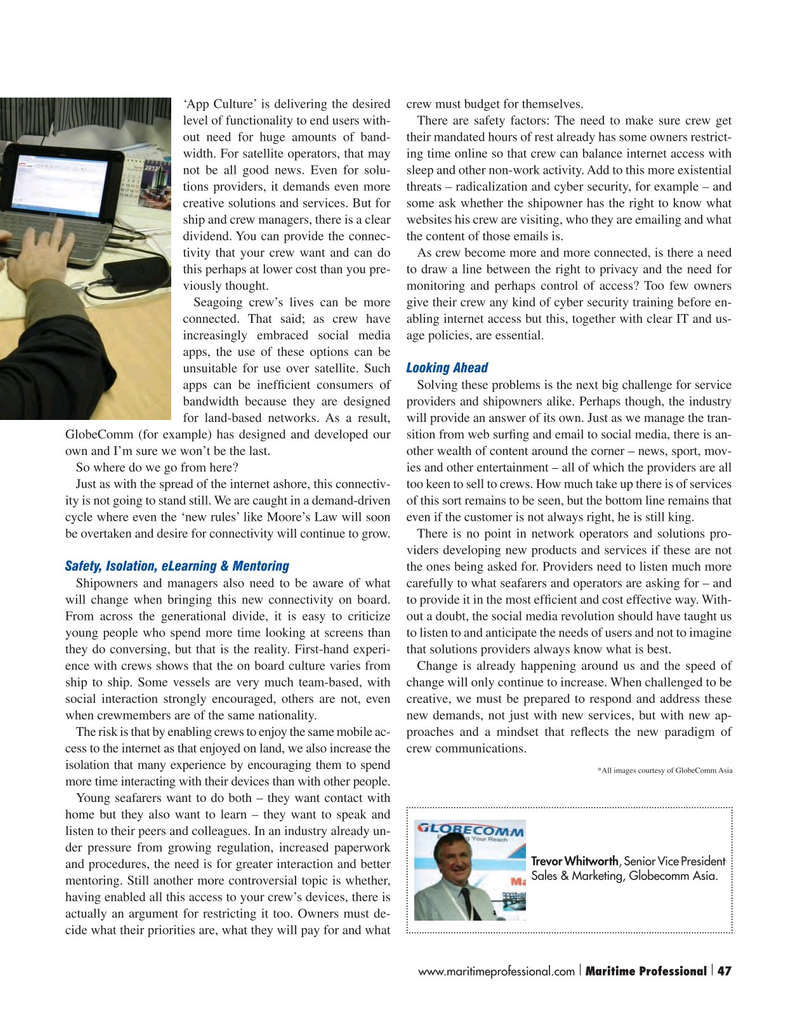
Page 47: of Maritime Logistics Professional Magazine (Q1 2016)
Maritime Training and Education
Read this page in Pdf, Flash or Html5 edition of Q1 2016 Maritime Logistics Professional Magazine
‘App Culture’ is delivering the desired crew must budget for themselves.
level of functionality to end users with- There are safety factors: The need to make sure crew get out need for huge amounts of band- their mandated hours of rest already has some owners restrict- width. For satellite operators, that may ing time online so that crew can balance internet access with not be all good news. Even for solu- sleep and other non-work activity. Add to this more existential tions providers, it demands even more threats – radicalization and cyber security, for example – and creative solutions and services. But for some ask whether the shipowner has the right to know what ship and crew managers, there is a clear websites his crew are visiting, who they are emailing and what dividend. You can provide the connec- the content of those emails is.
tivity that your crew want and can do As crew become more and more connected, is there a need this perhaps at lower cost than you pre- to draw a line between the right to privacy and the need for viously thought. monitoring and perhaps control of access? Too few owners
Seagoing crew’s lives can be more give their crew any kind of cyber security training before en- connected. That said; as crew have abling internet access but this, together with clear IT and us- increasingly embraced social media age policies, are essential.
apps, the use of these options can be unsuitable for use over satellite. Such Looking Ahead apps can be inef? cient consumers of Solving these problems is the next big challenge for service bandwidth because they are designed providers and shipowners alike. Perhaps though, the industry for land-based networks. As a result, will provide an answer of its own. Just as we manage the tran-
GlobeComm (for example) has designed and developed our sition from web sur? ng and email to social media, there is an- own and I’m sure we won’t be the last. other wealth of content around the corner – news, sport, mov-
So where do we go from here? ies and other entertainment – all of which the providers are all
Just as with the spread of the internet ashore, this connectiv- too keen to sell to crews. How much take up there is of services ity is not going to stand still. We are caught in a demand-driven of this sort remains to be seen, but the bottom line remains that cycle where even the ‘new rules’ like Moore’s Law will soon even if the customer is not always right, he is still king. be overtaken and desire for connectivity will continue to grow. There is no point in network operators and solutions pro- viders developing new products and services if these are not
Safety, Isolation, eLearning & Mentoring the ones being asked for. Providers need to listen much more
Shipowners and managers also need to be aware of what carefully to what seafarers and operators are asking for – and will change when bringing this new connectivity on board. to provide it in the most ef? cient and cost effective way. With-
From across the generational divide, it is easy to criticize out a doubt, the social media revolution should have taught us young people who spend more time looking at screens than to listen to and anticipate the needs of users and not to imagine they do conversing, but that is the reality. First-hand experi- that solutions providers always know what is best.
ence with crews shows that the on board culture varies from Change is already happening around us and the speed of ship to ship. Some vessels are very much team-based, with change will only continue to increase. When challenged to be social interaction strongly encouraged, others are not, even creative, we must be prepared to respond and address these when crewmembers are of the same nationality. new demands, not just with new services, but with new ap-
The risk is that by enabling crews to enjoy the same mobile ac- proaches and a mindset that re? ects the new paradigm of cess to the internet as that enjoyed on land, we also increase the crew communications.
isolation that many experience by encouraging them to spend *All images courtesy of GlobeComm Asia more time interacting with their devices than with other people.
Young seafarers want to do both – they want contact with home but they also want to learn – they want to speak and listen to their peers and colleagues. In an industry already un- der pressure from growing regulation, increased paperwork
Trevor Whitworth, Senior Vice President and procedures, the need is for greater interaction and better
Sales & Marketing, Globecomm Asia.
mentoring. Still another more controversial topic is whether, having enabled all this access to your crew’s devices, there is actually an argument for restricting it too. Owners must de- cide what their priorities are, what they will pay for and what www.maritimeprofessional.com Maritime Professional 47| | 34-49 Q1 MP2016.indd 47 2/29/2016 11:14:54 AM

 46
46

 48
48
